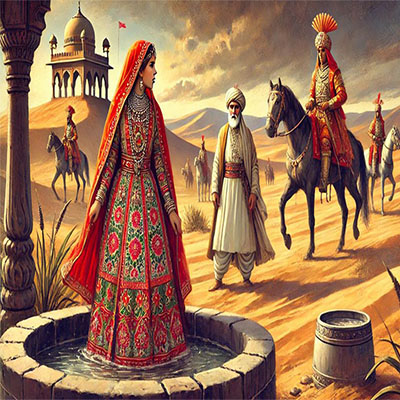Marui / Marvi
Shah Abdul Latif Bhittai, the great Sufi poet of Sindh, masterfully weaves the tale of Marvi in his poetic masterpiece, Shah Jo Risalo. Through the Sur Marui, Bhittai immortalizes the legend of Marvi, a humble village girl whose integrity and love for her homeland stand as a timeless testament to human values. The poetry of Sur Marui goes beyond a mere tale of abduction and resistance; it delves into profound spiritual and philosophical questions about identity, freedom, and the eternal bond between humans and their land.
Marvi, a village girl from Malir, lives a simple yet fulfilling life in her homeland. Her beauty and grace attract the attention of King Umar of Umerkot, who abducts her and brings her to his palace. Umar offers her wealth, comfort, and the position of queen, but Marvi rejects all his advances. Her heart remains with her people and the arid yet beloved sands of Malir. Marvi endures the king’s attempts to win her over with unwavering resolve, and ultimately, her integrity forces Umar to let her return to her village.
- Patriotism and Love for Homeland The most striking theme in Sur Marui is Marvi’s undying love for her homeland, Malir. Shah Abdul Latif uses Marvi’s longing for her simple village life as a metaphor for the human soul’s yearning for its spiritual home. Marvi’s declaration that no wealth or power can replace the love of her native land reflects the poet’s own deep connection to Sindhi culture and identity
- Spiritual Symbolism
Like much of Bhittai’s poetry, Sur Marui carries profound spiritual undertones. Marvi’s journey represents the soul’s struggle against material temptations and its quest to return to its true source. The palace of King Umar symbolizes worldly desires, while Malir represents the spiritual sanctuary that lies within. - Feminine Strength and Integrity
Marvi’s character is a powerful example of feminine strength and moral resilience. Her refusal to compromise her values, even under duress, is a bold assertion of her dignity and self-respect. Bhittai elevates Marvi to a status of a spiritual guide, whose integrity inspires generations. - Critique of Materialism
Through the stark contrast between the opulence of the palace and the simplicity of Malir, Bhittai critiques materialism. Marvi’s rejection of wealth emphasizes that true wealth lies in one’s connection to their values, culture, and community. - Resilience and Resistance
Marvi’s resistance against the king’s power underscores the universal human struggle for freedom and autonomy. Her steadfastness becomes a symbol of the triumph of inner strength over external domination.

The Poetic Beauty of Sur Marui
Bhittai’s Sur Marui is written in Sindhi verse, blending rich metaphors, vivid imagery, and melodic rhythms. The desert of Thar becomes a living entity in his poetry, evoking its harshness and beauty. The repetition of Marvi’s longing for Malir mirrors the soul’s relentless pursuit of its true home. Bhittai’s verses capture both the physical and emotional landscapes of the story, making it resonate across cultures and time.
Relevance in Modern Times
The story of Marvi continues to hold relevance today as it speaks to universal values of integrity, identity, and resistance. In an age of increasing globalization and materialism, Marvi’s love for her homeland serves as a reminder to cherish one’s roots and traditions. Her courage in the face of oppression inspires movements for justice, freedom, and cultural preservation worldwide.
Conclusion
Shah Abdul Latif Bhittai’s Sur Marui is more than a folkloric tale; it is a profound exploration of human values and spiritual truths. Marvi’s unwavering love for Malir and her moral strength elevate her to a symbol of integrity and resilience. Through his poetic genius, Bhittai transforms her story into a timeless allegory that continues to inspire and enlighten. As we read Sur Marui, we are reminded of the enduring power of love, humility, and the eternal bond between humans and their homeland.